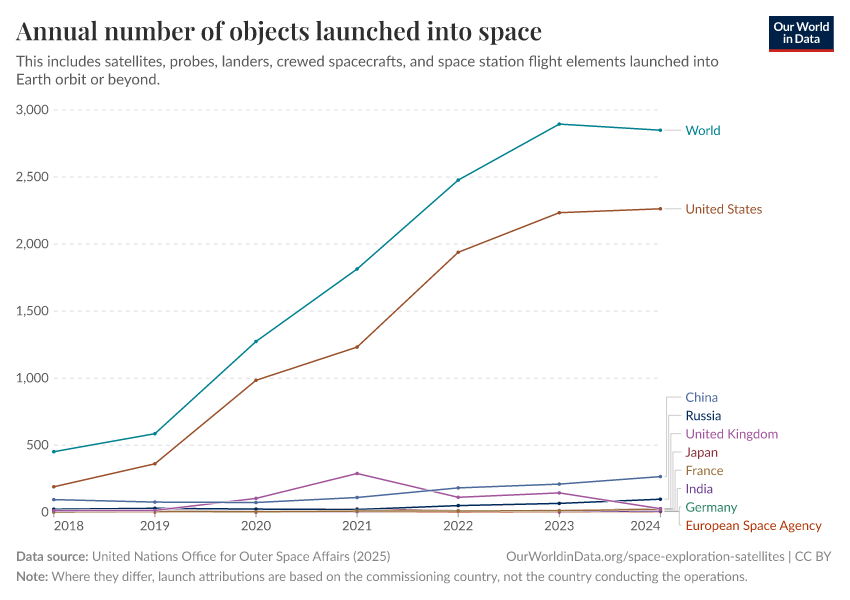Annual number of objects launched into space

What you should know about this indicator
- Objects are defined here as satellites, probes, landers, crewed spacecrafts, and space station flight elements launched into Earth orbit or beyond.
- This data is based on national registers of launches submitted to the UN by participating nations. According to UN estimates, the data captures around 88% of all objects launched.
- When an object is marked by the source as launched by a country on behalf of another one, the launch is attributed to the latter country.
- When a launch is made jointly by several countries, it is recorded in each of these countries' time series but only once in the 'World' series.
What you should know about this indicator
- Objects are defined here as satellites, probes, landers, crewed spacecrafts, and space station flight elements launched into Earth orbit or beyond.
- This data is based on national registers of launches submitted to the UN by participating nations. According to UN estimates, the data captures around 88% of all objects launched.
- When an object is marked by the source as launched by a country on behalf of another one, the launch is attributed to the latter country.
- When a launch is made jointly by several countries, it is recorded in each of these countries' time series but only once in the 'World' series.
Sources and processing
This data is based on the following sources
How we process data at Our World in Data
All data and visualizations on Our World in Data rely on data sourced from one or several original data providers. Preparing this original data involves several processing steps. Depending on the data, this can include standardizing country names and world region definitions, converting units, calculating derived indicators such as per capita measures, as well as adding or adapting metadata such as the name or the description given to an indicator.
At the link below you can find a detailed description of the structure of our data pipeline, including links to all the code used to prepare data across Our World in Data.
Notes on our processing step for this indicator
- We scrape the data from the source by iterating through all objects in the online index.
- We harmonize the names of countries. When an object is marked by the source as launched by a country on behalf of another one, we attribute the launch to the latter country.
- We aggregate launches by country and year. When a launch is made jointly by several countries, it is recorded in each of these countries' time series.
- We calculate the total number of launches globally. This is available as 'World' in the data. When a launch is made jointly by several countries, it is only recorded once in the 'World' series.
- We also calculate the cumulative number of launches over time.
Reuse this work
- All data produced by third-party providers and made available by Our World in Data are subject to the license terms from the original providers. Our work would not be possible without the data providers we rely on, so we ask you to always cite them appropriately (see below). This is crucial to allow data providers to continue doing their work, enhancing, maintaining and updating valuable data.
- All data, visualizations, and code produced by Our World in Data are completely open access under the Creative Commons BY license. You have the permission to use, distribute, and reproduce these in any medium, provided the source and authors are credited.
Citations
How to cite this page
To cite this page overall, including any descriptions, FAQs or explanations of the data authored by Our World in Data, please use the following citation:
“Data Page: Annual number of objects launched into space”, part of the following publication: Edouard Mathieu, Pablo Rosado, and Max Roser (2022) - “Space Exploration and Satellites”. Data adapted from United Nations Office for Outer Space Affairs. Retrieved from https://archive.ourworldindata.org/20260109-090050/grapher/yearly-number-of-objects-launched-into-outer-space.html [online resource] (archived on January 9, 2026).How to cite this data
In-line citationIf you have limited space (e.g. in data visualizations), you can use this abbreviated in-line citation:
United Nations Office for Outer Space Affairs (2025) – with major processing by Our World in DataFull citation
United Nations Office for Outer Space Affairs (2025) – with major processing by Our World in Data. “Annual number of objects launched into space – UNOOSA” [dataset]. United Nations Office for Outer Space Affairs, “Online Index of Objects Launched into Outer Space” [original data]. Retrieved February 17, 2026 from https://archive.ourworldindata.org/20260109-090050/grapher/yearly-number-of-objects-launched-into-outer-space.html (archived on January 9, 2026).